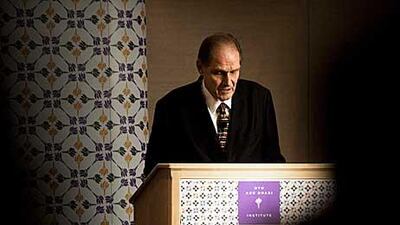ABU DHABI // The United States could not achieve its global goals without the co-operation of the UAE and other countries in the region, a former US diplomat said in the capital this week.
Dr William Rugh, who served as US Ambassador to the UAE between 1992 and 1995, spoke on Wednesday at New York University Abu Dhabi. Dr Rugh offered a wide-ranging assessment of President Barack Obama's foreign policy in the Gulf and the Middle East.
"Americans are, more than ever, dependent on the peoples of this region for support," Dr Rugh said. "We have a lot of common interests with the governments and the peoples of this area and we should work closely together."
Mr Obama "knows that America cannot accomplish its goals alone. He badly needs the help and support from the UAE and other friends in the region," Dr Rugh said.
He said terrorism could not be countered by armies alone and that success required "sensible policies, diplomacy and above all international cooperation".
He added that the most fruitful way to improve relations with the Muslim world was through direct and continued dialogue.
"It is the last three feet that count [in diplomacy]," he said, referring to the distance between two people in a face-to-face conversation.
Commenting on Mr Obama's speech in Cairo in June, he said a lot of Muslims were now disappointed because Obama had not met their expectations.
He said the reason for that was not so much Obama failing to meet his promises as Muslims not understanding Obama's dilemmas at home.
"Muslims looked at him as the leader of the sole superpower in the world and that he was an elected leader, so they thought he was capable of change," Dr Rugh said. "They heard him say he would change the situation, but I heard him say he would try.
"Elsewhere in the world, Obama's [approval ratings] are still much better than Bush's, but not in the Gulf and the Middle East. That is an interesting contrast. Obama raised hopes in his Cairo speech that he would move more effectively to resolve the Arab-Israeli conflict and other issues. When that did not happen, high expectations faded. People, in my opinion, expected too much."
He said Obama's "right instincts" were hindered by opposition from Congress and other emerging factors around the world such as the alleged fraud in the Iranian elections.
He cited the president's efforts in engaging with Syria, which were impeded by Congress blocking the appointment of an experienced diplomat, Robert Ford, as US ambassador after the post sat vacant for five years.
But despite congressional opposition and the occasional lack of interest of the American people, he said, President Obama was still persistent in using diplomacy rather than force and cooperation rather than confrontation. The Obama administration, he said, did not shy away from criticising Israel in public despite the unpopularity of such criticism.
"He is resolved to helping the Iraqis, although Iraq is no longer a front-page story in the United States," he said.
Commenting on the WikiLeaks episode, in which around 250,000 State Department documents exposing candid reporting by US diplomats around the world were leaked, he said the incident would "seriously hamper American diplomacy". The leaks, he said, added "an additional burden to diplomacy but they would not have a lasting damage".
He said trust was essential in diplomacy and that it would take a while before restoring that trust with foreign leaders and interlocutors. More practically, he said, the current system of classification was flawed if it allowed a mid-level soldier at the Pentagon to have access to such documents.
"The basic rule in classification in our system is you have to have the need to know in order to have access to the materials. He should never have had access to that," Dr Rugh said.

